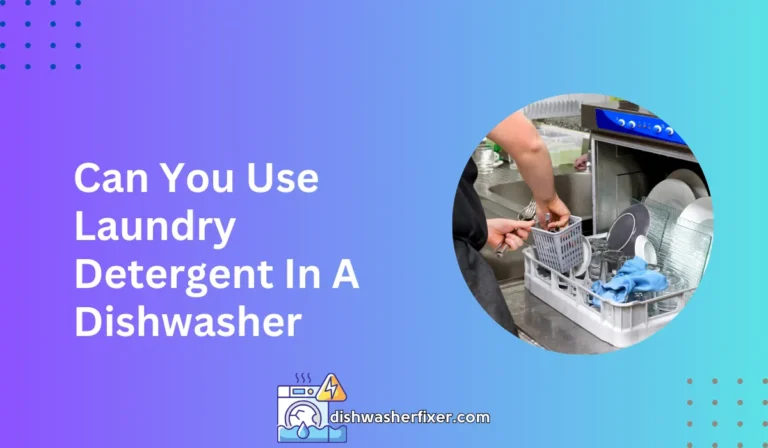Why Does My Dishwasher Make My Dishes Dirty? Solve It Now!
Your dishwasher may make dishes dirty due to clogged filters, food remnants, or faulty spray arms. Regularly clean filters and check for debris. Ensure proper loading to avoid obstruction of water jets.
Common Causes of Dishwashers Leaving Dishes Dirty

Improper Loading Techniques
When dishes are not loaded correctly, they can block the spray arms that distribute water inside the dishwasher. This prevents the water from reaching all surfaces, leaving some dishes dirty.
To avoid this, make sure that large items do not obstruct the movement of the spray arms and that there is enough space between dishes for water to circulate.
Overloading the Dishwasher
Adding too many dishes can lead to them not getting properly cleaned. Overloading can cause dishes to nest together, preventing water and detergent from reaching all areas.
Make sure to leave gaps between dishes and follow the manufacturer’s recommendations for maximum capacity.
Wrong Detergent Type or Amount
Using the wrong detergent or too much of it can leave a residue on dishes. It’s important to choose a detergent that is designed for dishwashers and to follow the recommended amount for your water hardness and load size.
Too little detergent can also be an issue, resulting in dishes not being cleaned thoroughly.
Dirty Filters and Drains
Food particles and debris can clog the dishwasher filters and drains. This can cause water to become contaminated and redeposit dirt onto the dishes. Regularly cleaning the filters and checking the drains for blockages can help prevent this problem.
Hard Water Mineral Buildup
In areas with hard water, mineral deposits can accumulate in the dishwasher, affecting its performance. This buildup can lead to spots and film on dishes. Using a rinse aid or water softener can mitigate these effects.
Excessive Food Residue on Dishes
Dishes with large amounts of food left on them can cause the dishwasher to work less effectively. While it’s not necessary to pre-rinse dishes, scraping off large food particles can help ensure that your dishwasher cleans effectively.
Troubleshooting Steps to Identify the Issue

Cleaning the Spray Arms
Check the spray arms for clogs by inspecting the holes where water sprays out. If you find blockages, you can use a toothpick or small brush to gently remove debris. This will help ensure that water can flow freely and reach all the dishes.
Inspecting and Cleaning the Dishwasher Filter
Locate and remove the dishwasher filter according to your model’s instructions. Rinse it under running water and use a soft brush to remove any trapped particles. A clean filter allows for better water circulation and cleaner dishes.
Evaluating Detergent and Rinse Aid
Assess if you’re using the correct detergent and rinse aid for your dishwasher and water type. Adjust the dosage according to the instructions and consider trying different brands if you’re experiencing problems with residue or spots on dishes.
Running an Empty Cycle
To clear out any leftover residue, run your dishwasher empty on a hot cycle. This can help flush away any dirt or grease that might be causing issues.
Testing Water Hardness
If you suspect hard water is the culprit, test your water hardness with a kit. If the results indicate hard water, consider installing a water softener or using dishwasher salt to improve your appliance’s cleaning efficiency.
Maintenance Tips for Optimal Dishwasher Performance

Cleaning Schedule
Set a regular cleaning schedule for your dishwasher. Clean the filter and spray arms monthly, and wipe down the interior walls and door seals to prevent mold and odors.
Vinegar Cycle for Hard Water
Running a monthly vinegar cycle can help dissolve mineral buildup from hard water. Pour a cup of white vinegar into the bottom of an empty dishwasher and run it on a hot cycle.
Correct Loading Patterns
Make sure to load your dishwasher correctly by following the manufacturer’s guidelines. Place items with their dirty surfaces facing the water spray and avoid overlapping.
Choosing the Appropriate Wash Cycle
Select the wash cycle that matches the type of load you’re cleaning. Heavy cycles are best for pots and pans, while light cycles are suitable for delicate items and glasses.
Keeping Rinse Aid Dispenser Filled
Ensure your dishwasher’s rinse aid dispenser is always filled. Rinse aid helps water to sheet off dishes, preventing spots and ensuring they dry properly.
FAQs About Dishwasher Issues
Why are my dishes coming out of the dishwasher still dirty?
Dishes may come out dirty due to clogged filters, leftover food particles, or malfunctioning spray arms that impede water flow and cleaning effectiveness.
How can I prevent my dishwasher from leaving residue on dishes?
Prevent residue by regularly cleaning the dishwasher filters, ensuring that the spray arms are not obstructed, and by properly loading the dishwasher to avoid blocking the water jets.
What should I check if my dishwasher isn’t cleaning properly?
Check for clogged filters, debris in the spray arms, and ensure that dishes are loaded correctly so that water can circulate freely.
Can a faulty dishwasher spray arm cause dishes to be dirty?
Yes, a faulty or clogged spray arm can prevent water from reaching all the dishes, leading to poor cleaning results.
Is there a correct way to load dishes to ensure they come out clean?
Yes, load dishes according to the manufacturer’s instructions to avoid obstructing the spray arms and to allow water and detergent to reach every surface effectively.
Final Thoughts
Dishwashers can leave dishes dirty if filters are clogged or spray arms malfunction. Accumulated food remnants also contribute to this issue. To ensure cleanliness, regularly maintain your dishwasher by cleaning filters, checking for debris, and loading dishes correctly to prevent water jet blockages.





